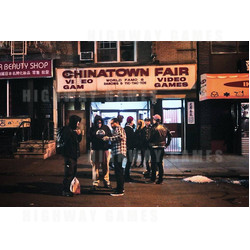As featured in
The Wall Street Journal , "The Lost Arcade" is a new documentary featuring Lonnie Sobel who transformed Chinatown Fair, once a darkened home for fighting game enthusiasts into a family friendly music and rhythm game center.
After its closure in 2011, Chinatown Fair was said to be the last of its kind in Manhattan. The documentary "The Lost Arcade" shows the venues double reincarnation—first in the form of a new arcade called Next Level, opened in Brooklyn by former Fair manager Henry Cen, and then when the Fair itself was purchased and reopened by entrepreneur Lonnie Sobel.
When the arcade reopened under Mr. Sobel’s management, many of its former patrons, including Mr. Hokura, were disappointed with the place’s shiny new aesthetic, its more family-friendly atmosphere and the replacement of fighting games with more music- and rhythm-based games.
“The people that were there, those people hate it because I took a place that was a love of their life, their hangout, and I turned it from a fighting location to an everything location,” said Mr. Sobel.
The changes, he said, were the only way to keep the place afloat.
Today, both Next Level and the new Chinatown Fair Family Fun Center are still in operation, albeit with very different business models and cultures.
Mr. Sobel, who has been involved in the arcade business for decades, said he had initially made a half-million dollar investment into Chinatown Fair, seeing an opportunity to revamp a legendary business that failed, in his opinion, because it “never got out of the fighting-game business.”
Mostly, the new operation has been a struggle.
But in the past five months, he said, “revenue has been great,” a turnaround he attributes to his strategy of hosting events and film shoots and continually bringing in new games. He and his partner reinvest 10% to 12% of gross income into new titles, he said.




